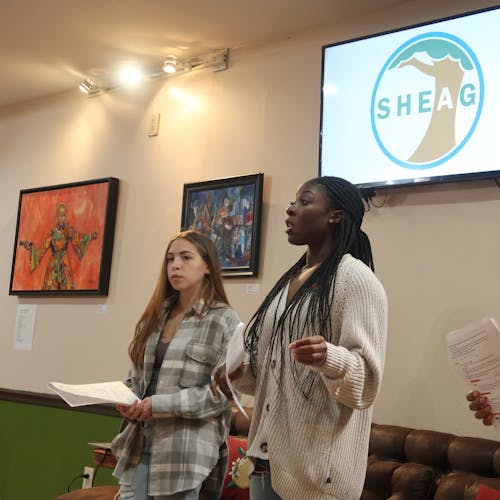Rutgers alumnus advocates for pro-vaping agenda

Touring through Johannesburg in 2013, Gregory Conley, the president and founder of the American Vaping Association (AVA) and Rutgers alumnus, found himself in a dilemma.
At the time, Conley was the legislative director for the Consumer Advocates For Smoke-free Alternatives Association (CASAA). He kept tabs on all 50 states on legal and advocacy issues related to vaping and smokeless tobacco. He fought bills in state legislatures and learned to do interviews vouching for smokeless tobacco products.
“He lived and breathed (his work),” said Julie Woessner, the current national policy director of CASAA who worked alongside Conley at the time. “At 2 a.m. he'd be leaving me messages or he'd wake up in the middle of the night and think of something and leave me a note. He does work on vacation and takes it with him.”
The work, though, was unpaid. And having just finished his first court clerkship, the freshly-minted Rutgers—Camden law school graduate was split between taking an entry-level attorney job or continuing his passion in vaping advocacy.
Conley, who was in South Africa for the Global Tobacco and Nicotine Forum, was unsure what to do. That changed, though, when he started chatting with a cigar industry consultant by chance, which changed the trajectory of his professional career. For Conley, it was a turning point.
“He said, ‘If you really like (vaping advocacy), if you really want to do it, you owe it to yourself to take six months or a year and see if you can make it work,’” Conley said in an interview with The Daily Targum. “And fortunately it has.”
Conley, now 32 years old, founded the AVA, a vaping advocacy group. He agrees with categorizing his work as "vaping evangelicalism," although he makes sure all his arguments are scientifically based, he said. He still vapes casually, but the only vape tricks he can do is a “very sad 'o.'"
“I enjoy nicotine, it’s one of my vices in life, I just don't get it from inhaling smoke," he said.
Prior to vaping, Conley smoked cigarettes for eight years. He remembers feeling physically ill from the tar, a turning point for him to quit. He tried nicotine patches, lozenges and regular pharmaceuticals to no prevail.
During law school in 2010, though, he was able to quit with the help of a watermelon-flavored vape. Instantly, he became a believer.
“I knew that if the products could improve, if they could have different flavors and a longer battery life, they could save a whole lot of lives,” he said.
Juggling law school, Conley became involved with vaping advocacy. As a 25-year-old law school student, he was negotiating with elected officials, learning the intricacies of state legislatures and representing vaping in media.
He remembers the federal and state governments at the time trying to regulate the products or designate them as pharmaceutical drugs, which “didn’t sit right” with him, especially as cigarettes remained available.
Seven years later, Conley is continuing that work but in a higher capacity and with higher stakes. Now, he worries that vaping could be “regulated to death” and faces a larger existential crisis than it did 10 years ago, most of which, he thinks is based on misinformation.
“Right now we are facing a population that believes that more and more nicotine products are killing people but also young people,” he said. “That is not correct.”
Working at least 60 hours a week, Conley spends his time spreading his pro-vaping and debatable agenda. In media interviews, he often comes with his numbers and studies on the vaping industry and breaks out into an almost stump speech.
"Vaping is 95% safer than smoking,” he said in defense of nicotine vaping. “You can look at the cancer biomarkers in the body, blood and urine of smokers, vapers and non-smokers. Cancer biomarkers of vapers are nearly indistinguishable from non-smokers. You can look at studies of what happens in the lungs when somebody switched to vaping versus getting off nicotine altogether. You see lung function return at a similar rate as to that of a smoker who quits nicotine entirely."
When asked about the statement, though, Rutgers Professor Michael Steinberg, the director of the Tobacco Dependence Program, provided responses debunking Conley’s claims, including that the 95% figure was derived from consensus opinion of one expert vaping panel and not scientific fact and that nicotine could potentially promote cancer.
“We do not yet truly know the long-term health effects of e-cigarette use,” he said.
Still, Conley keeps himself busy promoting vaping. In the week he spoke with the Targum, he was featured in the Wall Street Journal, New York Daily News, CNN and BBC Radio, and sent out several press responses and drafted two op-eds.
Aside from media, Conley also spends a lot of time on the road — approximately five months out of the year by his estimates. Just last week he attended a President Donald J. Trump rally in Texas to organize a crowd of approximately 100 protestors to protest the vaping flavor ban, but he also travels internationally from East Asia to Europe to advocate for vaping.
“Just recently he went to Africa but he was only there for two days,” said Mike Moran, who owns Firehouse E-Cigs & Vapors in Cherry Hill and Deptford, New Jersey, and who works with Conley.
Moran said vaping helped him quit cigarettes. Moran left the healthcare industry to become a small business owner and worked alongside Conley in his 2017 Right to Vape Tour, testified with him in front of state budget committees and even the Office of Management and Budget (OMB) and Food and Drug Administration (FDA) in Washington, D.C.
Small business owners like Moran could help get Trump out of office in 2020 if he persists to vilify vaping products, Conley said. Swing states with thousands of vape shop owners and vapers could sway the outcome of the election.
“All you need is a small percentage of vapers to be so angry that a president that pledged to rein in the bureaucracy would do this,” he said. “They (could) just stay home or vote third party. Or for (Sen.) Elizabeth Warren (D-Mass.).”
Conley admits that he could put himself out of business if he is good enough at his job, successfully promoting the public image of vaping — but he finds that improbable. Instead, he predicts he will continue working in this field for at least the next 30 to 35 years of his life – but he does not have a problem with that.
“I could have probably by now taken a much more boring job working for one of the companies involved in the industry,” he said. “But I think that there's much more that can be accomplished in the nonprofit world.”



